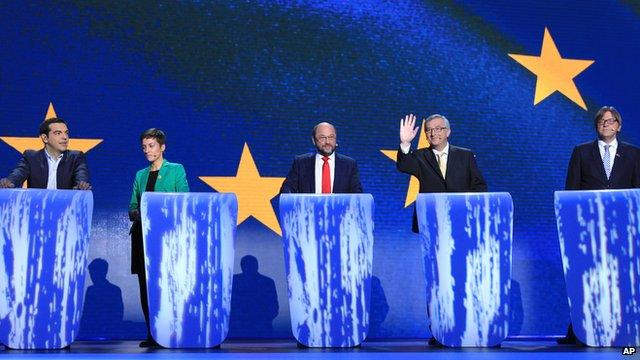EU leadership rivals hold big debate in TV landmark
- Published

Five rivals, from left: Alexis Tsipras from Greece, Ska Keller and Martin Schulz from Germany, Luxembourg's Jean-Claude Juncker and Belgium's Guy Verhofstadt
Five rivals for the EU's top job have argued over the economic crisis, immigration and other key issues for the 28-nation bloc in a live TV debate.
The party candidates were trying to impress millions of European voters. They are vying for the job of president of the European Commission.
The Greens' leader Ska Keller got loud applause in the Brussels hall when she criticised bankers' behaviour.
The rivals have held some previous TV debates, but this was the biggest. , external
The other four candidates debating were: Jean-Claude Juncker of the centre-right European People's Party (EPP) bloc; Martin Schulz of the Social Democrats (S&D); Guy Verhofstadt of the Liberals (ALDE) and Alexis Tsipras of the European Left.
The European economy dominated the candidates debate, as Gavin Hewitt reports
When the rivals were challenged about low voter engagement in the EU there was broad agreement that more EU transparency was needed.
Mr Schulz said that "in the past the European elections were boring", but this TV debate was part of a new drive for transparency.
But he said voters were concerned about big issues such as "the 27 million unemployed", and "the highest rate of tax evasion ever" in Europe. "They are waiting not for more Europe, but for another Europe," he said.
Mr Juncker said the EU "needs minimum social standards for workers" and lamented that "too many billions" had been misspent.
Candidates also agreed that the EU should urgently establish a common policy on legal migration, to curb the influx of illegal migrants.
Mr Verhofstadt got loud applause when he said Europe should do much more to help Syrian refugees.
For the first time, national leaders choosing the Commission president are supposed to "take account" of the European election result, which will be known on 26 May.
But they may still decide not to pick any of these five.
Body language
The BBC's Simon Wilson, reporting from the European Parliament venue, says Mr Verhofstadt was "the most animated - even when not speaking", while Mr Schulz had a good position in the middle, which "helped him look presidential".
Mr Juncker from Luxembourg, Mr Schulz (Germany) and Mr Verhofstadt (Belgium) are all veterans of EU politics who want more EU integration. Opponents often label them "federalists".
The debates are part of the political campaigning ahead of the 22-25 May European elections.
Ms Keller of the Greens, the youngest leader among the five, "had by far the most support in hall - big cheers for each of her interventions", our reporter says.
The debate was broadcast live on the BBC Parliament channel and on the web on Democracy Live.
It was shown all over Europe - on 49 TV channels - and in 24 languages.
Democracy worries
A joint statement from the EPP, S&D and ALDE says the next Commission president must be chosen from among the party groups' candidates, in order to respect citizens' expectations and make the EU more democratic.
ALDE spokesman Neil Corlett told the BBC that "for the first time we have a procedure which can engage people in an election - if it were to be ignored by the heads of state it would be not only an affront to the electorate but damaging for European democracy as a whole".
But the BBC's Europe editor Gavin Hewitt says the real bargaining is likely to begin at an EU summit on 26-27 June.
Under EU rules, the 28 government leaders - the European Council - put forward their candidate for the job and the European Parliament then votes on the nominee. The Council is not obliged to back any of the candidates proposed by the European parties.
The party group led by the UK Conservatives - the European Conservatives and Reformists (ECR) - has not put forward a candidate. But it issued a statement, external complaining strongly about being "excluded" from the TV debate.
"We believe in rolling back the EU bureaucracy... We are here to speak for the millions of Europeans who do not want to be part of a federal super-state. Sadly, this important perspective will not be represented in this 'non-debate'," the statement said.